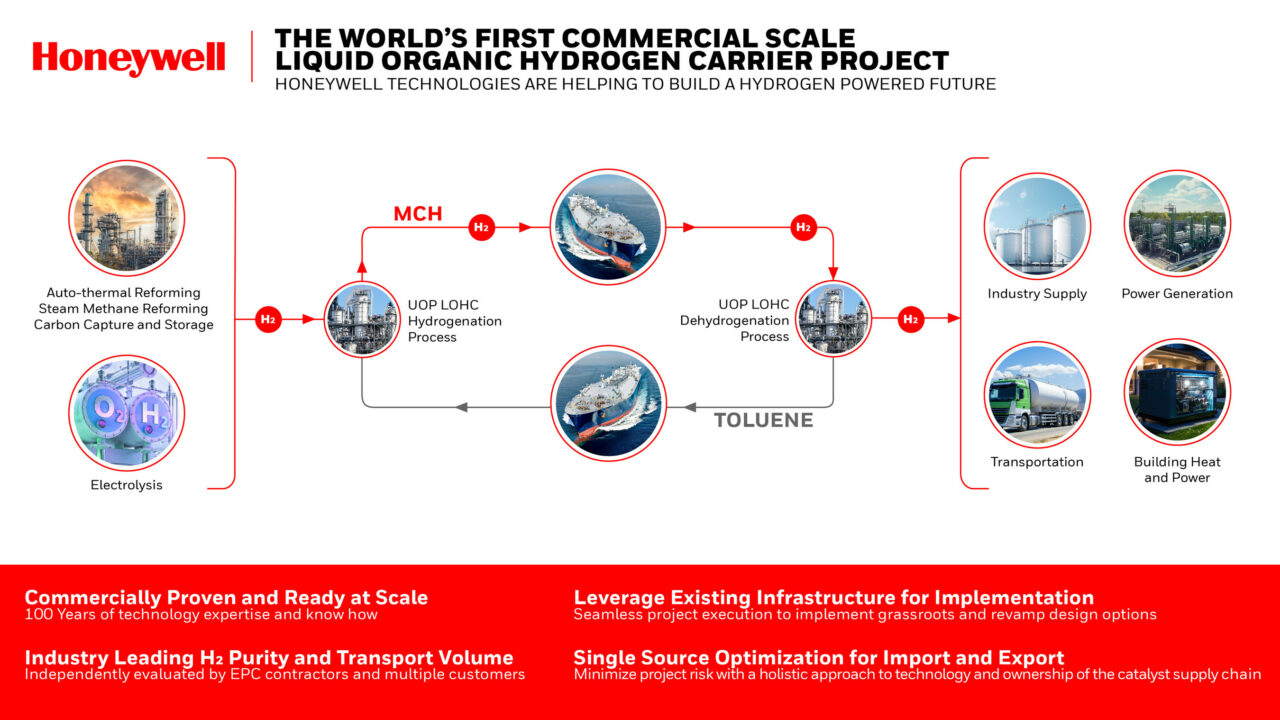
The global energy landscape is undergoing significant changes due to the pressing issue of climate change and the limitations of fossil fuels.
While renewable sources such as solar and wind show great potential, their intermittent nature creates challenges in maintaining a balance between supply and demand. This is where hydrogen comes into play as a clean energy carrier with exceptional potential.
Being the most abundant element, hydrogen offers great promise as a versatile and clean fuel. It can be produced from various sources, including water electrolysis powered by renewable energy, providing a genuinely zero-emission solution. Its capacity to store large amounts of energy and convert it back into electricity or heat makes it suitable for a wide range of applications, from powering vehicles and buildings to fueling industrial processes.
A significant challenge to wider hydrogen adoption is its transportation and storage. Hydrogen gas, in its natural state, is light and demands substantial energy for compression and liquefaction, resulting in expensive and inefficient long-distance transport. Innovative solutions like Honeywell's Liquid Organic Hydrogen Carrier (LOHC) offer a safer, more efficient, and effective way to ship and store hydrogen using existing infrastructure.
These advancements, including LOHC, present a promising outlook for the future of clean energy by addressing the transportation and storage challenges, paving the way for a hydrogen-powered future and enabling a shift towards a sustainable and low-carbon energy landscape.
Importance of Hydrogen in Decarbonizing Economies
The urgent need for decarbonization demands innovative solutions. While renewable sources like solar and wind are crucial, their limitations leave a gap. Hydrogen steps in, not as a competitor, but as a powerful ally.
Let's explore its role in slashing emissions and its unique advantages over other renewables
Emission Slayer
Unlike fossil fuels, hydrogen emits no harmful greenhouse gases when used. When generated from renewables like water electrolysis, its entire lifecycle becomes virtually carbon-free. This makes it ideal for traditionally fossil-fuel-reliant sectors like heavy industry, transportation, and even power generation.
More Than Just Green
Hydrogen boasts unique strengths compared to other renewables:
- Storage Champion: Hydrogen's ability to be easily stored and transported addresses the intermittency problem of renewables, allowing for the storage of excess solar and wind energy to ensure grid stability.
- Multifaceted Fuel: Hydrogen's capability to be converted into electricity, heat, or synthetic fuels makes it adaptable to diverse energy needs, expanding its potential beyond the limitations of direct electricity use.
- Packing a Punch: Compared to batteries, hydrogen offers significantly higher energy density, making it ideal for long-distance transportation, especially for heavy vehicles like trucks and ships.
Powering Change, Sector by Sector
From fuel cell electric vehicles to hydrogen-powered aircraft, hydrogen offers cleaner and more efficient transportation alternatives. In the industry, hydrogen serves as a clean feedstock and fuel, enabling the decarbonization of steel production, ammonia synthesis, and other industrial processes traditionally reliant on fossil fuels. Additionally, hydrogen-powered turbines can deliver flexible and emissions-free power generation, complementing renewable sources in grid balancing.
Challenges in Hydrogen Transportation
Hydrogen's clean energy potential is hindered by a critical roadblock: transportation. Its gaseous nature poses unique challenges, leading to inefficient and costly delivery. Current methods, such as pipelines, have limitations in reach and require substantial infrastructure investments. Liquefaction, while suitable for long-distance transport, demands specialized infrastructure and is energy-intensive.
Although chemical carriers offer safer transport, they introduce conversion steps that impact efficiency. The solution lies in innovation, with advanced materials for pipelines and tanks promising safe and efficient transport. Additionally, solid-state storage provides compact and potentially lower-cost options.
Organic Liquid Carriers like Honeywell's LOHC leverage existing infrastructure for flexible and scalable transport. Addressing these challenges is crucial as it unlocks efficient, cost-effective hydrogen transport, paving the way for a cleaner, more sustainable future powered by this versatile clean energy carrier.
Emerging Technologies: Liquid Organic Hydrogen Carriers (LOHC)
The dream of clean, efficient hydrogen transportation has a new contender: Liquid Organic Hydrogen Carriers (LOHC). This innovative technology addresses the key challenges that have hampered hydrogen's widespread adoption. The essence of LOHC lies in hydrogen gas reversibly bonding with a liquid organic compound, forming a stable, easily transportable liquid. This 'hydrogen-rich' liquid can be shipped across long distances using existing infrastructure, like pipelines and tankers. At the destination, the hydrogen is released through a simple
Honeywell's Pioneering Solution
Honeywell's LOHC technology is remarkable for its efficiency and scalability. Their collaboration with ENEOS represents a significant achievement: the world's first commercial-scale LOHC project. The process involves hydrogen gas reacting with toluene at a facility using Honeywell's proprietary catalyst, resulting in the creation of methylcyclohexane (MCH), a safe, liquid carrier. MCH is then transported using existing infrastructure, eliminating the need for expensive liquefaction or specialized pipelines. At the destination, the MCH releases its hydrogen through a simple heat-driven process, making it readily available for use, while the toluene is recycled back to the starting point for further hydrogen loading.

Honeywell technology selected by ENEOS for pioneering LOHC project
LOHC's Winning Formula
This innovative solution addresses several key challenges in hydrogen transportation:
- Safety: Unlike compressed hydrogen gas, MCH is a liquid, eliminating risks associated with high-pressure transportation.
- Cost-Effectiveness: LOHC utilizes existing infrastructure, reducing costs compared to building new pipelines or liquefaction facilities.
- Scalability: The modular design of LOHC systems allows for easy scaling, adapting to growing hydrogen demand.
- Versatility: LOHC can be integrated with various renewable energy sources for green hydrogen production.
Integration with Existing Infrastructure
The clean energy potential of hydrogen is indeed remarkable, and the challenges in its transportation and storage have been significant. However, with the introduction of LOHC technology, we have a game-changing solution that leverages existing infrastructure, paving the way for the seamless integration of hydrogen into our energy systems.
Unlike traditional approaches that require specialized pipelines or costly liquefaction, LOHC utilizes existing refining assets and infrastructure. The magic lies in its liquid carrier, typically a hydrocarbon like toluene, which allows hydrogen to reversibly bind with it, transforming into a stable, easily transportable liquid. This 'hydrogen-rich' liquid can be pumped, stored, and shipped using existing pipelines, tankers, and storage facilities, significantly reducing infrastructure investment needs.
LOHC's Integration Advantages
This innovative approach offers several advantages for integrating hydrogen into existing energy systems:
- Cost-Effectiveness: Leveraging existing infrastructure dramatically reduces costs compared to building new pipelines or liquefaction facilities.
- Scalability: Modular LOHC systems can be easily scaled up or down, adapting to fluctuating hydrogen demand and integrating seamlessly with existing capacity.
- Flexibility: LOHC systems can be located at various points in the energy chain, enabling flexible deployment and integration with diverse applications.
- Interoperability: Hydrogen released from LOHC can be used in existing natural gas infrastructure for power generation, heating, and industrial processes, facilitating a smooth transition.
Synergy with Traditional Sectors
LOHC doesn't just coexist with existing systems; it fosters potential synergies:
- **Refining Industry: Integrating LOHC can revitalize refineries by utilizing their underutilized storage and transportation assets for hydrogen.
- **Natural Gas Sector: LOHC-derived hydrogen can be blended with natural gas, reducing carbon emissions and paving the way for a gradual clean energy transition.
- **Industrial Sectors: Industries currently reliant on fossil fuels can leverage LOHC for cleaner feedstock and fuel, decarbonizing their operations.

Honeywell Introduces Liquid Organic Hydrogen Carrier Solution
Policy and Regulatory Framework
While LOHC and other innovations address technological challenges, a supportive policy and regulatory framework is crucial for widespread hydrogen adoption. Here, we explore existing policies, the need for further support, and successful examples to chart a course for a hydrogen-powered future.
Currently, the policy landscape supporting hydrogen deployment varies significantly across regions and countries.
Some notable initiatives include:
- European Union: The EU Renewable Energy Directive and Hydrogen Strategy set ambitious targets and provide funding mechanisms for clean hydrogen production and infrastructure development.
- Japan: The Basic Hydrogen Strategy aims to establish a comprehensive hydrogen economy, offering subsidies and tax breaks for hydrogen production and utilization.
- California: The California Hydrogen Roadmap targets significant reductions in greenhouse gas emissions from transportation and incentivizes hydrogen fuel cell vehicles and infrastructure.
Despite these advances, further policy support is needed to accelerate hydrogen deployment:
- Harmonization of Standards: Clear and consistent international standards for hydrogen production, transportation, and storage are crucial for global market growth and investor confidence.
- Carbon Pricing: Effective carbon pricing mechanisms can create a level playing field, incentivizing clean hydrogen production and penalizing emissions from traditional fuels.
- Targeted Financing: Government funding and loan guarantees can de-risk early-stage hydrogen projects and attract private investment. Public-Private Partnerships: Collaboration between government and industry can accelerate technology development, infrastructure deployment, and market innovation.
Learning from Leaders
Examining successful policy frameworks can offer valuable insights:
- Germany's H2Global initiative: This public-private partnership facilitates international collaboration on hydrogen projects, accelerating technology development and market expansion.
- South Korea's Hydrogen Economy Roadmap: This ambitious plan has attracted significant investment and positioned South Korea as a leader in clean hydrogen technologies.
- China's National Hydrogen Energy Development Plan: This comprehensive plan focuses on large-scale infrastructure development and industrial applications, aiming to establish China as a major hydrogen superpower.
The Road Ahead
Implementing effective policies and regulations can unlock the full potential of hydrogen. By learning from leading examples, fostering international collaboration, and creating a supportive environment, we can pave the way for a global hydrogen economy, ensuring a cleaner, more sustainable future for generations to come. Remember, policy plays a crucial role in bridging the gap between technological innovation and widespread adoption, accelerating the clean energy transition powered by hydrogen.
Subscribe to the newsletter
Daily decarbonization data and news delivered to your inbox
Follow the money flow of climate, technology, and energy investments to uncover new opportunities and jobs.
Companies
Latest issues
-
How 45Q Credits Revived This Troubled $9B Megaproject
Inside This Issue 💰 How 45Q Credits Revived This Troubled $9B Megaproject 🍁 Commencement of First Phase Operations for a Carbon Capture and Storage (CCS) Project in Canada 🤝 Haffner Energy Secures...
-
The Deal Structure Everyone's About to Copy
Inside This Issue 💼 The Deal Structure Everyone's About to Copy 📈 Exxonmobil Raises Its 2030 Plan – Transformation Delivering Higher Earnings, Stronger Cash Flow, and Greater Returns ⚡ Nextera Wor...
-
Inside XCF Global's $300M Bet to Double U.S. SAF Output
Inside This Issue ✈️ Inside XCF Global's $300M Bet to Double U.S. SAF Output ⚙️ Capsol Technologies Signs MoU with US Utility to Deploy CapsolGT® for Low-carbon Gas Power Generation 🏭 Babcock &...
Company Announcements
-
Clean Planet Technologies (CPTech), part of the Clean Planet Group, has announced that its core pyrolysis-oil upgrading process has now been formally patented in both the United States and Saudi Ar...
-
(December 12, 2025 - Oslo, Norway) Nel ASA (Nel, OSE: NEL) is pleased to announce that following a seven-year development program, and now a successful start-up and production of clean hydrogen on ...
-
Hydrogen Technology Venture Launches in Bowling Green
BOWLING GREEN, Ky. — A new tech company is coming to Bowling Green, bringing dozens of jobs to Warren County. What You Need To Know UFS ARK will be a joint venture of United Fiber Sensing and OgM...
-
HyOrc Positions Green Methanol as the Economic Solution to Shipping’s Decarbonization Challenge
HOUSTON, Dec. 12, 2025 (GLOBE NEWSWIRE) -- HyOrc Corporation (OTCID: HYOR), a fully SEC-reporting clean-energy company focused on decarbonizing heavy industry, today commented on the growing global...